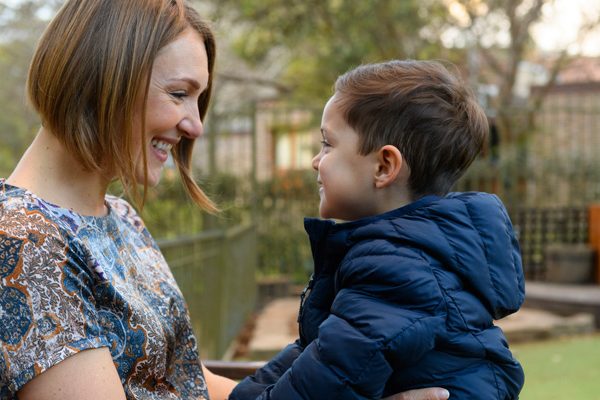Talking to babies changes their brains on a cellular level

New research from the University of East Anglia in the United Kingdom has found toddlers who hear more speech on the regular have more efficient-looking neurons.
Researchers captured thousands of hours of language data from babies and toddlers wearing small recording devices, along with MRI scans to study the structure of their developing brains, looking in particular at a substance called myelin.
They found that two-and-a-half year olds who heard more speech in their everyday environment had more myelin in language-related areas of their brains, something which they believe is likely to support more sophisticated language processing.
“We know that children’s brains develop very rapidly in the first two years of life, with brain volume at about 80 per cent that of an adult brain by the age of two,” lead researcher Professor John Spencer said.
“Myelin is made up of protein and fatty substances and forms an insulating layer around nerves in the brain. It makes brain signals more efficient.”
To simplify the findings, the Professor said “Imagine you have a hosepipe with lots of holes in it. Myelin is like wrapping the hosepipe with duct tape – it insulates neural fibres, bringing more of the ‘signal’ from one brain area to the next.”
“We wanted to know more about how this substance is involved with early brain development and particularly whether talking to young children boosts myelin production.”
The team studied data from 163 babies and toddlers, who wore small recording devices for up to 16 hours per day across three days. These devices captured 6,208 hours of language data in total – including speech from adults, conversational turns and words spoken by the children themselves.
To measure brain structure, the researchers waited until the infants fell asleep and then carefully placed them in an MRI scanner to measure brain myelin while the child slept.
“What we found is that the toddlers who heard more speech in their everyday environment, also had more myelin, which is likely to support more sophisticated language processing,” Professor Spencer said.
“In other words – talking to children is very important in early development as it helps to shape the brain.”
The study is one of the first to show that language input is associated with brain structure early in development.
“Prior work showed a similar association in four to six-year-olds, but our findings push this association much earlier in development. Indeed, we even found associations between language input and brain structure in six-month-old infants,” the Professor explained.
“At that age, it looks like language input might help delay myelination, possibly facilitating brain growth in language-related brain areas. Although there is still much more to learn about these processes, the message to caregivers is clear – talk to your baby, your toddler, your child. Not only are they listening, but your language input is literally shaping their brains.”
This research was led by the University of East Anglia in collaboration with Durham University, the University of Cambridge, the University of Iowa (US), Brown University (US), Leiden University Medical Centre (Germany) and Concordia University (Canada).
Language exposure and brain myelination in early development is published in the Journal of Neuroscience.
Popular

Workforce
Practice
Provider
Quality
Research
Supporting successful transitions: Big moves, big feelings
2025-06-26 11:00:30
by Fiona Alston

Quality
Practice
Provider
Research
ECEC in focus - Una Springwood’s intergenerational initiative brings young and old together through connection and care
2025-06-30 10:00:45
by Contributed Content

Provider
Practice
Quality
Research
Aboriginal Education Strategy drives early learning and school success in South Australia
2025-07-01 09:55:12
by Fiona Alston












